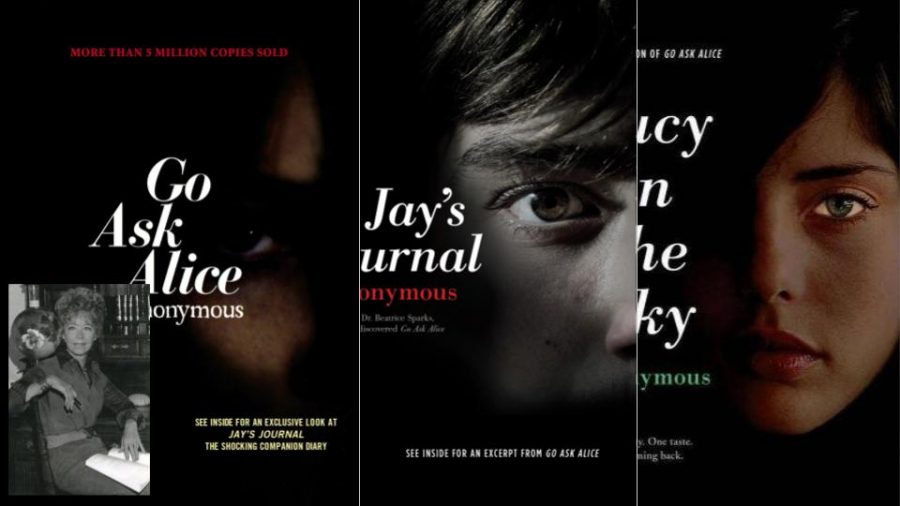The Problem with Go Ask Alice
A dark, adult subject matter, a creepy intriguing cover, and a message meant to stray kids from drugs, sex, teen pregnancy, the occult, and other things of that nature. Go Ask Alice, Jay’s Journal, and similar books would seem great for teens and a great tool for adults to show teens the danger of things like drugs and sex. But many readers of all generations have been objecting to those superlatives as older readers looking back are wondering how they were fooled, while new ones are becoming skeptics from the start.
Go Ask Alice Is a young adult novel framed to look like the diary entries of a high school girl who struggles with drug addiction. The “editor” Beatrice Sparks claims to have been close with the girl and that she recovered these entries and put them together to show the danger of drugs. This, however, is far from the truth; the story is entirely fabricated by Sparks, every character, place, and detail has been proven to be made up with there now being a disclaimer on every copy of the book that reads “This book is a work of fiction. Any references to historical events, real people, or real locales are used fictitiously. Other names, characters, places, and incidents are the product of the author’s imagination, and any resemblance to actual events or locales or persons, living or dead, is entirely coincidental” in small print on the copyright page.
But why? Well, many would say Sparks wanted to put a light on the dangers of teen drug use, though many now think otherwise. If you are unfamiliar with Beatrice Sparks, the important things to know are that she is an author who wrote young adult novels framed to look like the real diaries of troubled and usually deceased teenagers. She is known for exaggerating, misleading, or flat-out lying to further her career.
In fact not only have most of her books been proved to be fiction in one of her few books based on a real diary she manipulated the events to the point where the family of the boy who wrote the entries was appalled. Scott Barrett the brother of the boy wrote a book called “A Place in the Sun: The Truth Behind Jay’s Journal” where he and other family members describe the boy as a kind, good natured person who suffers from depression as opposed to a satanist drug user that he is portrayed as in the book. He even talked to the friends and acquaintances of the boy who Sparks claimed she got the ideas that he worshipped the occult from and those stories lined up with Barrett’s.
The books have been criticized for their unrealistic nature and endings, one example of this being in her 1996 “non-fiction” book Almost Lost, which is about a boy whose life Sparks claimed to drastically improve through counseling, despite there being no evidence that he or anything else in the book ever existed. Many people have also disliked the books conclusion, one being Sandra Doggett from the School Library Journal in her review of the book who said “[i]t is hard to imagine that the troubled teenager described in the beginning could change so dramatically so quickly and cure his father’s cocaine habit, recover from depression, and restore his parents’ marriage.”
An unrealistic ending to an unrealistic, inauthentic story is a pretty common theme in Spark’s novels. The most famous example of this is in her 1971 novel Go Ask Alice, where many aspects have been criticized for their implausible nature, some being how poorly the protagonist, a lonely teenage girl from an upper-middle-class home, who while dealing with body image issues and moving, turns to drugs, (noticing a pattern here?) was written. The character’s personality doesn’t even remotely resemble a teenage girl and instead seems much more like a sheltered middle-aged woman with lines like: “Not one more bite of chocolate or nary a french fried potato will pass my lips till I’ve lost ten globby pounds of lumpy lard. And I’m going to make a completely new wardrobe. Who cares about Ridiculous Roger?” The book also faced criticism for how ridiculous and unfeasible her path to drugs was with her going from accidentally taking LSD at a party to using amphetamines within a few days.
Instead of powerful stories that resonate with teens, Sparks’s books come off as ignorant propaganda that Paul Wake Baker called “The Reefer Madness of Books” in his review of the book. Due to their poor writing and lack of realism teens are likely to brush off Go Ask Alice and books like it as ridiculous propaganda or remember for all the wrong reasons.
Sarah Conroy (She/Her) is a Senior at Shaker High School and this is her first year as a the Lead Writer fourth year with The Bison as a member of the...


